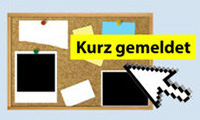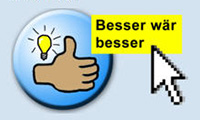Get informed & announce topics on campus.

“Kurz gemeldet” is the central platform for university institutions and student groups. Announcements and event information can be published there.
“Kurz gemeldet” posts can be viewed in the following ways:
- Start page “Kurz gemeldet”: All announcements
- Intranet start page: Four most recent announcements
- Newsletter for university members: All announcements since the last newsletter
- Institution homepage: All announcements from that institution
- UniNow App: All announcements
- Email subscription: All announcements from individually subscribed senders
Special topics
- Notifications from the University Management
- People: Recognition for special achievements
- Obituaries: The University of Hohenheim mourns the loss of deceased employees.
Publish your own announcements
Those who are registered as web editors can directly write and publish “Kurz gemeldet” contributions online. Student groups can contact the Online Courier editor.
The sender decides whether the message is sent to all university members or only to students or employees.
Instructions

The Hohenheim Online Courier (HOnK) is the news editorial department for the campus. The editorial department reports on a daily basis, is independent in terms of content, and is obligated to criteria for journalistic quality.
The Online Courier articles are directed at university members and only available on the intranet. This is intended to create a protected space for internal discussion and contribute to information be published for university members as soon as possible and in greater detail.
The editorial department for the Online Courier is in the Media & Marketing Department. An editorial board, appointed by the Senate, monitors the content independence, neutrality, and journalistic quality and is the point of contact for complaints about violations.
The Online Courier articles can be found in the following ways:
- Start page for Online Courier: All articles
- University social media channels: Selected articles
- Intranet start page: Four most recent articles
- Newsletter for university members: All articles since the last newsletter
- Hohenheim App: All articles
Contribute your own topics
The editorial department selects topics that have the highest news value for the greatest number of university members. Important news factors for the Online Courier include: Timeliness (also: relation to current debates), relation to university, news value, identification for Hohenheim members, utility, central university actors (e.g. representatives of status groups, President's Office), social relevance, curiosity, uniqueness. The Online Courier topics are chosen by the full-time editorial department, which usually also writes the articles.
Topics can be suggested for the Online Courier in the following ways:
1. Suggest topic
University members can suggest topics via telephone or email. The sooner you inform the editorial department, the greater the chance of publication.
2. Write a press release
University members can also write topic suggestions for the Online Courier in the form of a press release and send it to the editorial board. Press releases are already formulated in an article format and can be used by the editorial board as the basis for an article.
As is typical for press releases, the editorial board retains the right to make changes or shorten the text before publication. Texts that are well-prepared in terms of journalistic standards and that correspond to the Online Courier’s criteria can also be published in the original version.
3. Write a guest article (opinion piece)
The Online Courier occasionally publishes guest contributions from university members. Guest contributions are pointed opinion pieces on current university topics. They reflect the subjective perspective of the authors, who are therefore explicitly named at the top of the article.
Contact the editorial department in advance to discuss a possible publication of the text. The same applies to guest articles: The topics for the guest contributions should also be interesting for as many university members as possible. As is the case with all Online Courier texts, the golden rules apply. Personal attacks and defamatory accusations without proof are prohibited.
In terms of form, the opinion articles should be clearly different from news articles in the Online Courier (usually first-person perspective, not in an interview format). The text should be written in a way that is easy to understand and should not use technical or administrative jargon. Text length: max. 5000 characters.
The guest contributions are introduced by a concise headline and a summarizing teaser. The headline and teaser must fit the formal criteria of the Online Courier and are therefore either written by the editor or coordinated between the authors and editor. The editor will also add a brief informational paragraph about the type of text.
4. Freelance work in the editorial office
Students and employees can work as “volunteer freelancers” with the Online Courier. The full-time editorial department plans topics together with these assistants and gives feedback before publication. Freelance editors take on the role of neutral campus reporters and should therefore not report for their own causes. The same journalistic quality criteria applies to these articles as to all other Online Courier articles.

“Besser wär besser” (better would be better) shares ideas and proposals for improving the campus, opens these up for discussion, and sees what other people have to say on the subject. It is also possible to comment on the suggestions.
Once a month, the Online Courier publishes an article on the topic with the most votes (during the lecture period). The number of votes can be seen with the blue button with a thumb. The Online Courier’s editorial department gathers statements from the university actors responsible for the topic. Besides this, the Online Courier reports at regular intervals on what happened to the old suggestions.
- Better would be better platform
Under each Online Courier article and “kurz gemeldet” announcement, there is space for comments. Students and university employees can discuss the topic of the article with other readers by entering their real names.
Opinions and criticism are expressly permitted, but it is important to the editorial team that the tone is respectful and objective. The three golden rules apply to comments, as well. Pseudonyms were abolished by decision of the Editorial Board in July 2021.
If you don’t want to miss any new comments, in the Online Courier you can find the newest comments from all articles on the upper right-hand side of the page and at the bottom of the intranet start page.
The university is represented on the following platforms, among others:
- Instagram (https://www.instagram.com/unihohenheim/)
- Facebook (https://www.facebook.com/UniHohenheim)
- Youtube (https://www.youtube.com/user/unihohenheim)
- Twitter https://twitter.com/UniHohenheim)
- linkedIn (https://www.linkedin.com/school/universitat-hohenheim)
- mastodon (https://xn--baw-joa.social/@unihohenheim)
Depending on the channel, the focus is on different target groups and topics. Instagram is primarily addressed to students and prospective students, Facebook and Youtube are aimed at all university members, alumni, internationals, and the interested public. Twitter focuses on the target groups press, politics, scientific community and stakeholders.
You would like to suggest a topic for the university's social media channels? Please contact the editorial office in good time to clarify which criteria apply to which channel and which content / media (incl. image rights) may be required.
The calendar of events shows dates that are aimed at a broader audience in the university or at the general public.
The schedule for the coming week will appear in the internal university newsletter. Public dates can be included in the external cultural and educational newsletter. For this purpose, a lead time of approx. 2 months is necessary.

